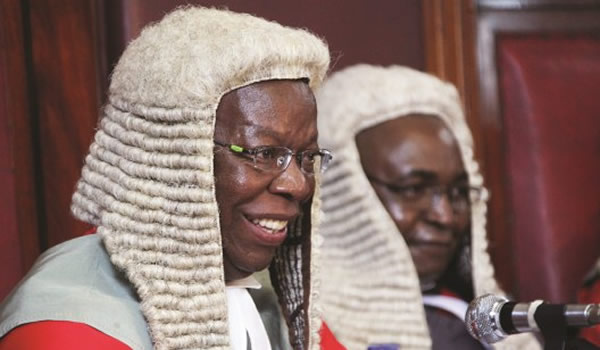By Mthulisi Mathuthu
A week after President Mugabe ordered the removal of the last remaining white farmers from their properties the Constitutional Court has allowed the eviction of a disabled Masvingo commercial farmer under the government’s land grab exercise.

Led by Chief Justice Godfrey Chidyausiku the court agreed with the state that William Stander’s rights were not breached by the order that he vacate his Mwenezi-based Benjani Farm.
Stander, who is a double amputee, wanted the court to stop his eviction which he said would deprive him of his only source of livelihood and was in breach of his constitutional rights.
The farmer argued that the state was ‘not in a legal position to prosecute or seek his eviction before it complies with the law by ensuring that he enjoys his protection by giving him compensation.’ Stander also said his eviction without compensation would render him ‘homeless’ and ‘take away his dignity.’
But Mugabe’s favorite lawyer and land grab beneficiary, Justice Chidyausiku and his team, dismissed Stander’s application saying it has ‘no merits and reasons of judgment will be given in due course.’
This was after the prosecution argued that every farmer whose land had been gazzetted for seizure must oblige and there was ‘no exemption for disabled persons.’
Prosecutor Fortunate Kachidza said if Stander wants compensation he must first vacate his ranch which was awarded to district administrator Stanley Chamisa, who was has previously been fined for assaulting the disabled farmer over the same property.
Dispossessed farmer and human rights activist Ben Freeth said the development was ‘sad.’ He added: ‘The Constitution, where there was hope that fundamental rights would be upheld, says that we have got no rights at all and this is a very sad reflection of where we are in Zimbabwe right now.’
He added: ‘The pronouncement by Mugabe a week ago that the few remaining farmers must be removed from the farms has now been boosted by this ruling which says we cannot approach the court.’
Freeth said in terms of Zimbabwe there was ‘nowhere else to turn’ and the farmers could only consider international law where chances for attaining justice were also minimal.
He said: ‘The great sadness is that the SADC Tribunal, which we relied, on has been disbanded and so that option is now closed to us. The other option is the African Commission on Human and People’s Rights, but it is a lengthy process and takes years to complete. A third option is the UN Human Rights Committee but Zimbabwe has not signed the protocol meaning we as individuals don’t have the right to approach it.’
In 2010 Justice Chidyausiku, who was awarded Estes Park farm in the Concession district, dismissed an application for a moratorium on farm seizures, effectively allowing the often deadly exercise to go ahead.
Chidyausiku, who replaced Justice Anthony Gubbay in 2001 (who was forced to take early retirement) is one of the more than 10 Supreme and High Court judges who benefitted from the controversial land grab exercise. SW Radio Africa






